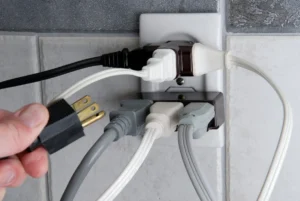The implementation of electrical safety tips for homeowners in your garage serves as a critical measure to mitigate potential hazards that could compromise both property and personal safety. By establishing a structured approach to electrical management, individuals can substantially reduce risks associated with common garage activities. Additionally, fostering an environment of awareness and responsibility encourages safer practices among family members. As we explore the various facets of electrical safety, it becomes clear that the benefits extend beyond mere compliance; they influence the overall functionality and security of your workspace. What specific strategies can elevate your garage’s safety measures?
Key Takeaways
- Implementing electrical safety tips reduces the risk of fire hazards, protecting both your property and your family’s safety.
- Regular inspections and maintenance enhance the longevity of your electrical systems, leading to fewer repair costs over time.
- A well-organized and safe garage workspace promotes efficiency, allowing you to focus on projects without distractions from hazards.
- Educating family members about electrical safety fosters a culture of responsibility, ensuring everyone is aware of potential risks.
- Strengthening community safety through shared knowledge helps prevent accidents, creating a more secure environment for everyone.
Understanding Electrical Hazards
Understanding electrical hazards is vital for ensuring a safe garage environment. Garages often serve as multifunctional spaces, housing not only vehicles but also tools, appliances, and various electrical devices. This diversity increases the potential for electrical risks, necessitating an extensive understanding of these hazards to protect both individuals and property.
Common electrical hazards in garages include overloaded circuits, exposed wiring, and improper use of extension cords. Overloading circuits can lead to overheating and fires, while exposed wires pose significant risks of electric shock. Additionally, the use of outdoor-rated extension cords indoors can create vulnerabilities, as these cords are not designed for such environments.
Moisture is another prevalent concern; garages may be subject to dampness, which can exacerbate electrical risks. Ensuring that all electrical installations comply with local codes is essential, as is the regular inspection of outlets and devices. By fostering awareness of these hazards, homeowners can create a secure environment that minimizes risks associated with electrical systems. Embracing the knowledge of electrical safety tips for homeowners is an important step toward achieving a safer and more functional garage space for everyone involved.
Essential Electrical Safety Tips
Implementing essential electrical safety tips is imperative for homeowners looking to maintain a secure garage environment. First and foremost, verify that all electrical outlets are grounded and equipped with Ground Fault Circuit Interrupters (GFCIs). These devices help prevent electrical shocks by cutting off power when a fault is detected.
Next, it is essential to regularly inspect power cords and extension leads for signs of wear or damage. Any frayed cords should be replaced immediately to mitigate fire risks. Additionally, avoid overloading outlets; this can lead to overheating and potential fires.

Organizing your garage can also enhance safety; keep electrical tools and equipment stored properly and out of the reach of children. Moreover, create a clear path to emergency exits and verify that your garage is well-ventilated to disperse any fumes from gas-powered tools.
Lastly, consider consulting a licensed electrician for periodic inspections, verifying that your garage’s electrical system complies with current safety standards. By adhering to these electrical safety tips for homeowners, you contribute to a safer and more secure garage environment for your family and belongings.
Common Garage Electrical Risks
Even with proper precautions in place, certain common garage electrical risks can pose significant threats to safety. One prevalent issue is overloaded circuits, which often occur when multiple high-wattage tools are plugged into a single outlet. This can lead to overheating and potential fire hazards. Additionally, improper wiring is a frequent concern, particularly in older garages where outdated electrical systems may not meet current safety standards.
Moisture is another critical risk factor; garages are often exposed to humidity, and water can easily come into contact with electrical outlets and equipment. This increases the likelihood of short circuits and electric shocks. Moreover, using extension cords as a permanent solution can create risks, as they are not designed for long-term use and can overheat or become damaged.
Lastly, neglecting to use ground fault circuit interrupters (GFCIs) in areas susceptible to moisture can lead to severe electrical accidents. Awareness of these common garage electrical risks is essential for homeowners aiming to create a safer environment. Implementing electrical safety tips for homeowners not only mitigates these dangers but fosters a sense of community responsibility towards shared safety standards.
Benefits of Safety Implementation
The implementation of electrical safety tips in your garage provides numerous benefits that extend beyond mere compliance with safety standards. To begin with, these practices greatly reduce the risk of electrical hazards, such as shocks and fires, thereby protecting both your property and the well-being of your family. By adhering to established safety protocols, homeowners can create a secure environment that fosters peace of mind.
Moreover, implementing electrical safety tips enhances the longevity of your electrical systems and appliances. Regular maintenance and safe usage can prevent wear and tear, ultimately leading to cost savings on repairs and replacements. Additionally, a safe garage promotes efficient workspaces, allowing you to focus on your projects without distraction or concern for potential accidents.
Educating family members about these safety tips fosters a culture of responsibility and awareness, encouraging everyone to participate in maintaining a safe environment. This sense of community is invaluable, as it strengthens family bonds while empowering individuals with knowledge and skills that can be applied in various settings.
Maintaining a Safe Garage Environment
Creating a safe garage environment is vital for every homeowner seeking to minimize electrical hazards. A well-maintained garage not only protects your valuable tools and equipment but also guarantees the safety of family members and guests. To achieve this, start by regularly inspecting electrical outlets for signs of wear or damage. Replace any frayed cords and verify that all devices are properly grounded.
Proper storage is important; avoid clutter by organizing tools and materials to prevent trip hazards and potential electrical fires. Store flammable substances, such as paints and solvents, in sealed containers away from heat sources. Additionally, install smoke detectors and fire extinguishers in your garage, making sure they are easily accessible.
Implementing adequate lighting is another key factor in maintaining safety. Well-lit spaces reduce the chance of accidents, allowing you to identify potential hazards quickly. Finally, familiarize yourself and your family with electrical safety tips for homeowners, emphasizing the importance of never overloading circuits. By adhering to these practices, you create a safe garage environment that fosters a sense of security and belonging for everyone in your household.
Frequently Asked Questions
What Tools Can Help Improve Garage Electrical Safety?
To improve garage electrical safety, utilize tools such as circuit testers, surge protectors, GFCI outlets, and proper extension cords. Implementing these electrical safety tips for homeowners guarantees a secure and efficient workspace, minimizing potential hazards.
How Often Should I Inspect My Garage’s Electrical System?
Inspect your garage’s electrical system at least once a year to guarantee safety and functionality. Regular assessments can identify potential hazards and maintain compliance with electrical safety tips for homeowners, promoting a secure environment.
Can I Use Extension Cords in My Garage?
Using extension cords in your garage is permissible, provided they meet safety standards and are not overloaded. However, it’s advisable to avoid permanent installations and to regularly inspect cords for damage to guarantee electrical safety.
What Should I Do if I Smell Burning Wires?
If you smell burning wires, immediately disconnect power to the affected area. Avoid using appliances until a qualified electrician inspects the wiring. Prompt action can prevent fires and safeguard your home and family’s well-being.
Are There Specific Safety Tips for Garage Workshops?
Yes, specific safety tips for garage workshops include ensuring proper ventilation, using high-quality extension cords, keeping flammable materials away from heat sources, and regularly inspecting electrical tools and outlets to prevent hazards and promote a safe working environment.
Conclusion
To sum up, implementing electrical safety tips in the garage greatly mitigates hazards, safeguarding both property and individual well-being. Adhering to essential safety practices fosters a more organized workspace, enhances focus on projects, and cultivates a culture of responsibility among family members. Furthermore, the dissemination of electrical safety knowledge strengthens community ties, contributing to a collective commitment to maintaining a safe environment. Ultimately, these measures lead to a more efficient and secure garage space, benefiting all users.
You May Also Like To Read:
